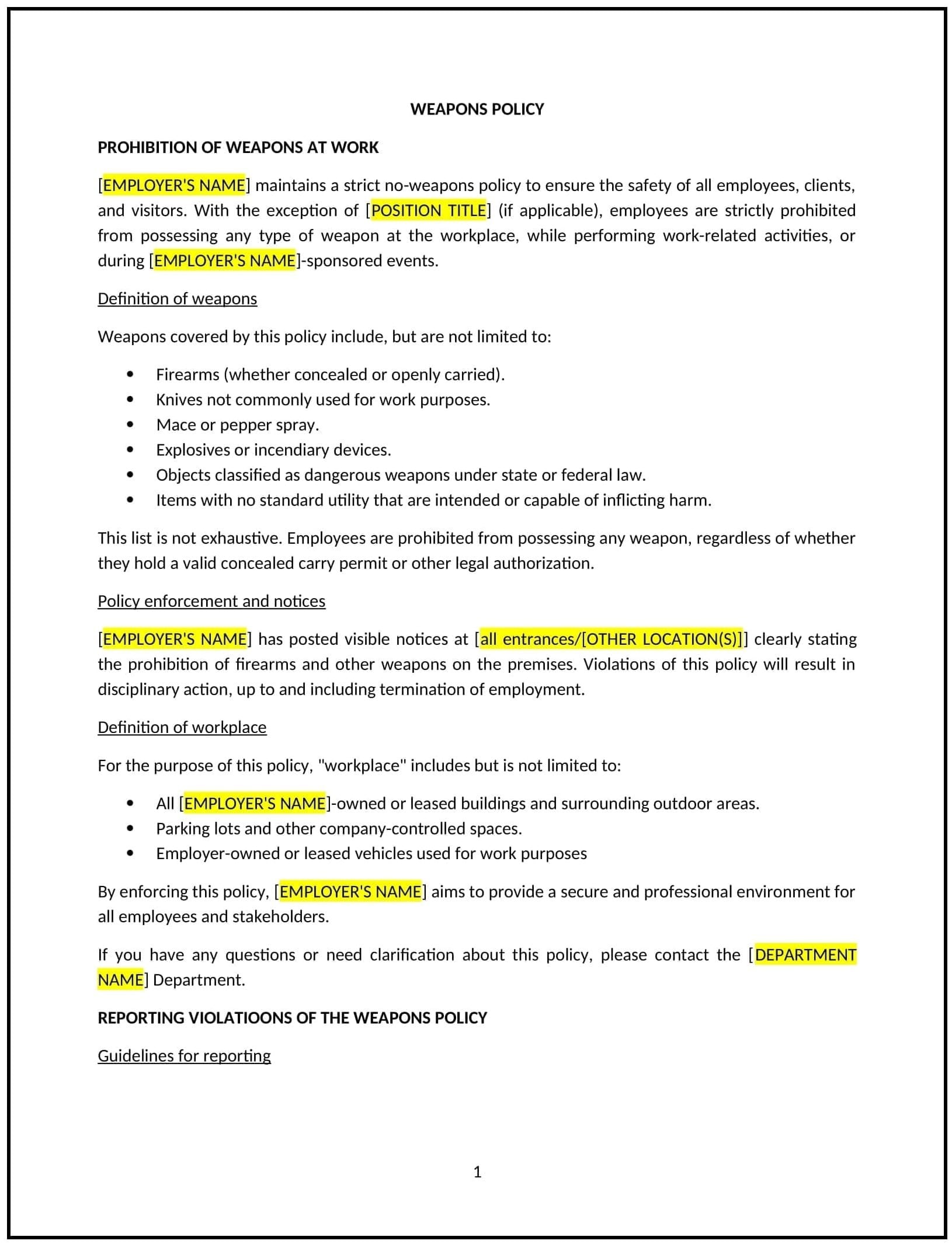Got contracts to review? While you're here for policies, let Cobrief make contract review effortless—start your free review now.

Customize this template for free
Weapons policy (Montana)
A weapons policy helps Montana businesses define the rules regarding the possession, use, and storage of weapons on company property. This policy outlines the company’s stance on weapons, the circumstances under which weapons are prohibited, and the actions to be taken in the event that weapons are found on the premises.
By implementing this policy, businesses can create a safe work environment, reduce the risk of violence or accidents, and ensure that employees and visitors understand the company’s expectations regarding weapons.
How to use this weapons policy (Montana)
- Define what constitutes a weapon: The policy should clearly define what constitutes a weapon, including firearms, knives, explosives, and other items that can be used to harm or threaten individuals. It should also specify if any items are exempt, such as weapons used for work purposes (e.g., law enforcement officers, security personnel).
- Set rules for possession on company premises: The policy should specify that weapons are not allowed on company property unless specifically authorized. This includes both employees and visitors. The policy should make exceptions only in special circumstances, such as law enforcement officers or security personnel on duty.
- Address storage and security: The policy should establish guidelines for how weapons, if authorized, must be securely stored while on company property. This can include requirements for locked storage or safekeeping areas to prevent unauthorized access.
- Clarify consequences of policy violations: The policy should outline the consequences for violating the weapons policy, including disciplinary action, suspension, or termination. It should also address the steps that will be taken if weapons are discovered on the premises.
- Establish procedures for reporting weapons: The policy should define the process for employees or visitors to report the presence of a weapon on company property, including whom to notify and how reports will be handled confidentially.
- Review and update regularly: The policy should be reviewed periodically to ensure it remains in line with changes in local, state, and federal laws, as well as company needs.
Benefits of using this weapons policy (Montana)
This policy provides several key benefits for Montana businesses:
- Promotes safety in the workplace: A clear weapons policy helps maintain a safe working environment by preventing weapons from being brought onto company property, reducing the risk of violence, accidents, or harm to employees and visitors.
- Minimizes legal risks: By clearly outlining the rules regarding weapons, businesses can reduce the risk of legal liability related to incidents involving weapons on their property.
- Enhances employee confidence: Employees are more likely to feel secure in their workplace if they know that a weapons-free policy is in place and strictly enforced.
- Improves workplace culture: A weapons-free environment fosters a culture of respect and safety, encouraging employees to focus on their work without concern for potential threats or violence.
- Reduces potential workplace conflicts: Clear policies help prevent misunderstandings and conflicts over the possession or use of weapons, contributing to a more peaceful work environment.
- Strengthens the company’s reputation: Businesses that prioritize safety and the well-being of their employees and visitors can build a positive reputation as a responsible and secure place to work.
Tips for using this weapons policy (Montana)
- Communicate the policy clearly: Ensure that all employees are aware of the weapons policy, including the definitions of weapons, the rules regarding possession, and the consequences of violating the policy. This can be included in the employee handbook or communicated through internal channels.
- Train employees on safety procedures: Provide training on how to recognize weapons and how to handle situations where a weapon is discovered on company property. This should also include instructions on how to report any potential threats or weapons to management.
- Establish a zero-tolerance approach: Reinforce the company’s commitment to maintaining a weapons-free environment by taking swift and decisive action against policy violators to ensure the safety of all employees.
- Monitor compliance: Ensure that employees are adhering to the weapons policy by regularly reviewing security procedures, conducting random checks if necessary, and taking action if violations are found.
- Review the policy periodically: Regularly review and update the weapons policy to reflect any changes in legal regulations or business operations to ensure it remains effective and relevant.